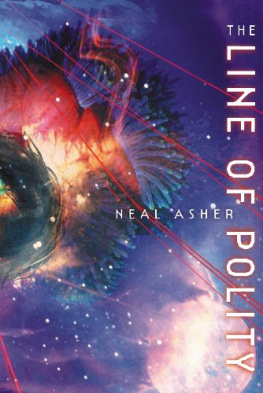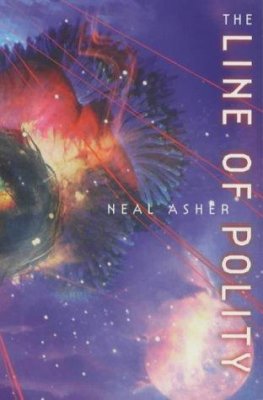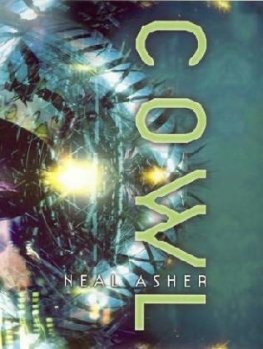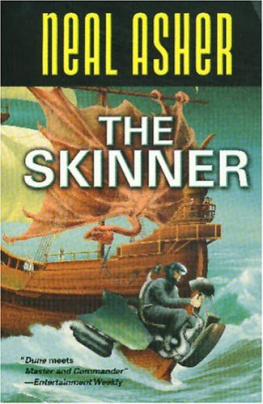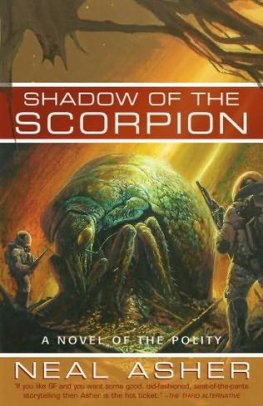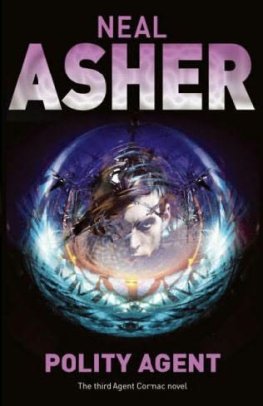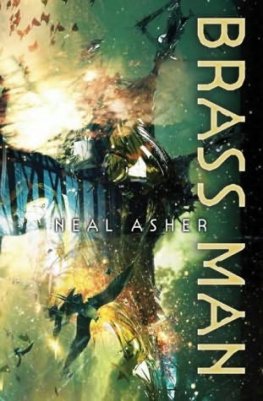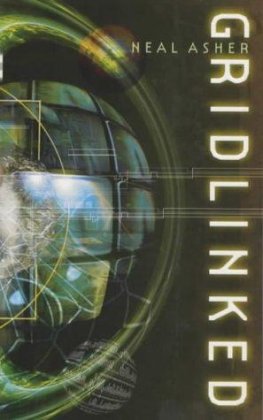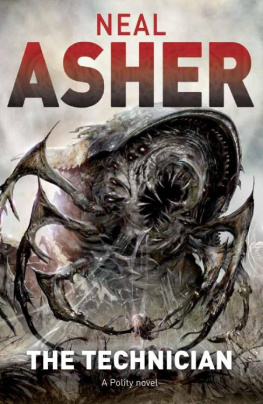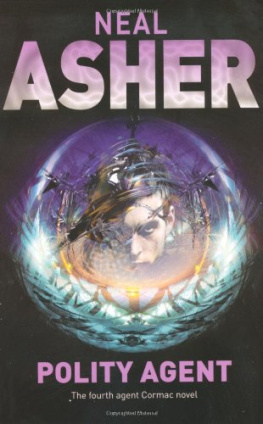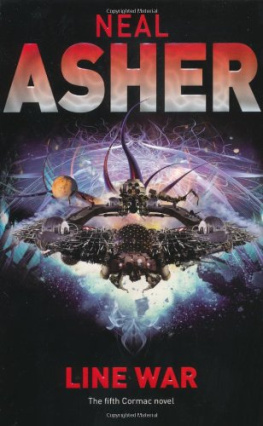
The Line of Polity
Neal Asher
(Agent Cormac book 2)
For Dawn, Samantha and Rebecca, Lorna and Jack, and all ensuing generations of readers
Acknowledgements
My thanks as always to Caroline for encouragement and support even when subjected to my readings, or tirades, about obdurate plotlines; Peter Lavery for his judicious pencil and lavish patronage; Stefanie Bierwerth for all her efficient help; Steve Rawlings, Richard Ogle and James Hollywell for those stunning covers; Jason Cooper and Chantal Noel for infiltrating my books into Germany and America; and to all the other staff at Pan Macmillan for their hard work.
Further thanks to all those people grafting in research establishments and laboratories across the world: people who will in years to come be putting wheelchair manufacturers out of business, restoring sight and creating artificial limbs when not finding ways to grow new ones finding cures for cancers and other ills, and generally bringing closer a future only small aspects of which the likes of myself attempt to imagine.
Prologue
Eldene felt weak and light-headed for the second time that morning and wondered if her scole was preparing to drop a litter of leaves. Running her thumb down the stick-seam of her shirt, she opened the garment to inspect this constant companion of hers that oxygenated her blood in exchange for a share of it. The scole clung to her chest, between and below her breasts, like a great flat aphid coloured in shades of dark brown and purple; however, it was a relatively small creature, as she was still a young woman. Observing a reddish flushing in the crevices between its many segments, as it rippled against her body, confirmed for her that it was drawing blood, and such frequent feeding in the course of one day indeed meant it was preparing to litter. She closed her shirt and gazed across the square-banked ponds to where shift foreman Ulat was speaking to Proctor Volus the latter easily identifiable by his white uniform and decided now was not the time to ask for a lighter work assignment. Gritting her teeth, she hoisted up her cone basket and moved on.
The squerms remained somnolent under the aubergine predawn skies, but that would change as soon as she started casting in the dried pig-meat flakes that were their favoured food. As she walked, Eldene observed her fellow workers scattered between the ponds that chequered the land to a horizon above which the gas giant Calypse ascended ahead of the sun. These ponds reflected the red, gold and opalescent green of the giant, and her fellows were sooty silhouettes against this reflection, weighed down by their huge cone baskets as they tramped along the banked-up paths for the morning feeding. Every now and again one of those ponds lost its reflectivity as squerrns fed voraciously, disturbing the turgid and slimy water. Eldene supposed the scene might be considered a beautiful one, but well understood that beauty was something you required energy to appreciate.
After propping her pole-grab and net against a nearby flood-post, Eldene lowered her basket to the ground, took up the scoop from the dried flakes it contained, and gazed down into the water. The squerms in this pond were each over a metre long and the thickness of her arm. Their brassy segmented shells gave the impression of something manufactured perhaps items of jewellery for some giant rather than of living creatures. The tail of each squerm tapered into a long ovipositor that Eldene knew, from experience, was capable of penetrating both flesh and bone. The head of each creature was a slightly thicker hand's-length segment that extruded a bouquet of glassy hooks to pull in food to be ground up by whirling discs deep in the creature's throat. Those hooks were not so lethal as the ovipositors, but they could still strip the skin off a worker's hand for a moment's inattention.
She tossed some meat-flakes upon the pond, and the water foamed as the squerms writhed and fed, their bodies gleaming in the lurid morning, feeding hooks flashing in and out of their mouths. A second scoop caused further frenetic activity, till some of the squerms were surging half their body-length out of the water. The third and final scoop quietened this activity a little.
Only one deader in this particular pond, Eldene was glad to see, and that one a fresh, so therefore unbroken, squerm. Stepping back, she retrieved her pole-grab to see if she could reach it from the bank, but it was too far out. She sighed, pulled on her armoured gauntlets, and waded in, treading down the mat of silkweed and algae rumpled up at the pond's edge, while the hooks and ovipositors of the squerms grated against her armoured waders. With the deader positioned in the jaws of the grab, she almost dropped the pole when a live squerm rose out of the water beside her, flashing out its glassy hooks only a metre from her face. She backhanded the creature, slapping it down into the water, before pressing the trigger of her pole to close its jaws round the deader, then she turned and trudged out of the pond, hauling it behind her. Once back on the bank, amongst the wild rhubarb and clumped flute grass, she paused to swallow bile feeling sick with fear and the weakness caused by the constant drain on her by her scole. After dropping the dead squerm on a mossy patch next to the path, she took up her feed basket again and moved on to the next pond. She'd collect the deader on her way back, along with any others, once she'd emptied this load of meat-flakes into the twenty ponds that made up her round.
As Eldene trudged towards the next pond, she gazed up at the satellites glittering in the sky, and tried to believe that beyond them lay wonders, and those seemingly magical worlds that had been described to her but it was difficult to see anything beyond this orbiting metal that might just as well have formed the bars of a prison.
The Outlink stations were poised on the surface of the sometimes expanding and sometimes contracting sphere of the Human Polity. They marked the line beyond which AI governance and Polity law no longer applied. Most of this sphere's border lay in intergalactic space, but on the edge of it facing towards the centre of the galaxy, the density of stars increased and the line was still shifting as worlds were subsumed by or seceded from the Polity. Here was a buffer zone of human occupation, beyond which lay numberless unexplored systems where people had ventured, but where hard fact blurred into strange tales and myth.
Each station had its own character, its own shape, and its own distinctive society. Over the centuries better materials and methods of manufacture had become available also fashions had changed. Some stations were spherical, others were ovoid, and others still were like steadily growing arrows. Station Miranda had the shape of a corn-stalk with accretions like fungus down its eight-kilometre length additions made during its long history and those who dwelt within it were strange to the transitory runcible culture.
Apis Coolant was one of the more exotic examples of his kind. He was so thin and lacking in muscle that gravity above one quarter of a gee would have collapsed him as if he were made of sugar sticks and tissue paper. He avoided the runcible travellers, who mostly kept to the one-gee areas death to him as even a friendly pat on the back from an Earth normal or near equivalent would break his spine. He did not mind this isolation: he preferred the warm electric atmosphere of the station near the scoop-field generators, just as he preferred the company of his own hairless multi-hued kind. However, the station was not small, and back near the fusion engines Apis had relatives but he never went there to see them. They were strange.
Next page
